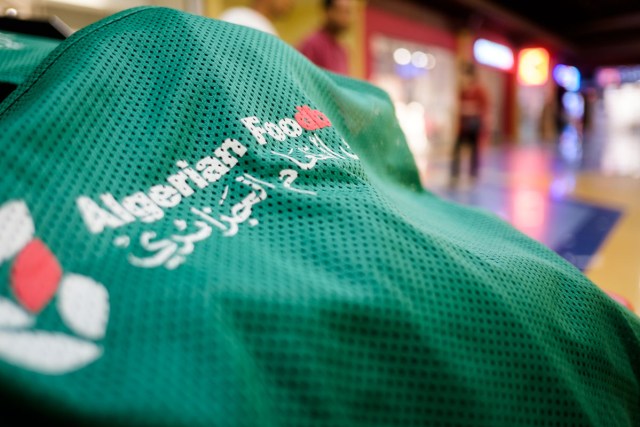From the supermarket with love
Algeria's first food bank

In a shaded space of the large, open-air parking outside Algiers’ big supermarket Ardis, a group of youth are busy sorting groceries into bags, then packing them into trolleys. They’re all in green vests – not to be confused with those worn by the cashiers inside, which are also green. The youth come from Algerian Food Bank, an anti-poverty initiative, and all food has been donated by shoppers inside.
This year is the fourth since Algerian Food Bank started, says Meriem Chikirou, from Association SIDRA who is behind the campaign. She carries a laptop under one arm, moves quickly between the small teams of two to three people strategically placed just outside the counters. Two hundred young people are involved this year, all of them volunteers.
Next to the tomatoes in the trolley are already packs with yellow couscous and big cans of cooking oil.
It’s Friday afternoon and the first weekend of this year’s Ramadan. It’s nearing six, and the line behind each counter grows longer and longer. Everyone wants to get everything they need, pay as quickly as possible, and make it home in time to do the last preparations for iftar. This year, with Ramadan stretching through three weeks in June and one in July, days are long. Sunset, the time to break the fast – a few minutes after eight – is just two hours away.

A little girl with braids in her hair walks up to one of the food bank teams and drops a can of tomatoes in the trolley for collected food. “Sahha,” the volunteers say, the common Algerian expression for thank you. Next to the tomatoes in the trolley are already packs with yellow couscous and big cans of cooking oil.

“We get a lot of this. Tomatoes, couscous, oil and sugar, the kind of things people need for cooking during Ramadan,” says Chikirou.
“People know already when walking into the shop what kind of food they can donate, because we have volunteers standing at the entrance telling them about the campaign.”

The idea is simple: food is available but often not for those most in need; collecting and redistributing solves that. Food banks as a concept originated in the US, where the first one was started in Arizona in 1967. While there is an interesting debate over the long-term impact of this kind of charity (does it make states less willing to guarantee citizens their right to livelihood and food?), the Algerian Food Bank is a short-term campaign, providing an alternative during the month of Ramadan for families who otherwise might have no option but ask people in the street for money to buy food.
The idea is simple: food is available but often not for those most in need; collecting and redistributing solves that.

During times like Ramadan, despite it being a month for generosity and humbleness, people tend to over-consume – even if Algeria does not have the tradition of overabundant, restaurant-served iftars. In fact, few places keep open for iftar during Ramadan, save a number of small restaurants serving free food for homeless people, travellers or others who are far from home. Some are run by the municipalities, others are private initiatives – and staffed by volunteers.

At Ardis, behind a trolley near one of the exits, are sisters Sabrine and Lylia Bouras. They joined the food bank campaign last year, during one of its last days. This time, both plan to spend the entire 10 days of the campaign collecting food.
“It’s nice because you can see the outcome immediately, it’s not just clicking ‘like’ on something. You know that you’re doing your best,” says Sabrine.
“I like that the campaign focuses on promoting good instead of what’s negative in society. People feel inspired, they see that it’s possible to actually make a change,” she adds.

Meriem Chikirou says that focusing on youth solidarity is the core idea with getting young people involved.
“We put the light on them rather than portraying families who receive food as poor. They are families with necessities, it’s as simple as that. We rather inspire through showing the volunteers.”
Besides the work of the volunteers, the food bank also receives support from Forum des Chefs d’entreprise (FCE), an association of Algerian business leaders. This year, the food bank hopes to deliver 7,000 boxes with food to families in 23 wilayas, or provinces, across Algeria. Once there, they have local partners – mosques, organisations – who help to identify families in need of support.

It is good timing this year, because schools and most universities finished in time for Ramadan and many young people are free during the days. Idir Makhlouf, another green-vested volunteer, says he wants to inspire others to do this kind of work.

“People think of volunteering as just social work. But I think we can impact more, we can change society. Personally, in the long run I want to be a teacher.”
Outside the supermarket, families pack their groceries into their cars. Slowly, the parking gets more and more empty; the highway leading past more busy with cars. The evening is warm, the light is soft; it has not yet started to get dark.

The volunteers push all the trolleys to a minivan parked on the side, where some are already packing bags into the back. Next stop for the groceries will the big stadium in the neighbourhood of Belouizdad, where the food will be repacked once more, then reaching its final destination – a kitchen somewhere in Algeria, to be prepared and served for iftar.







